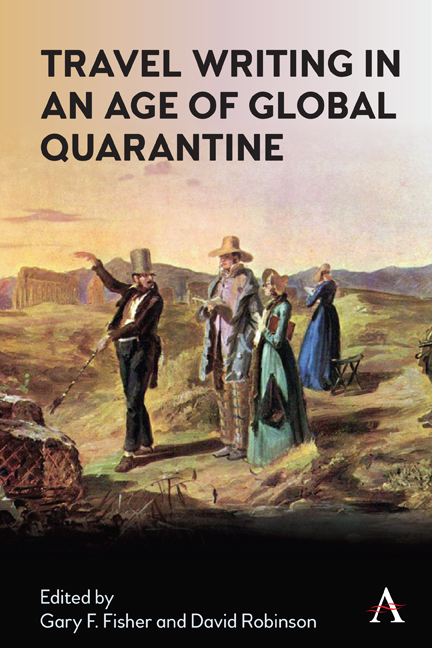Book contents
- Frontmatter
- Contents
- Foreword
- Acknowledgements
- Introduction
- Chapter One ‘Off-Stage, A War’: Wuhan, 1938
- Chapter Two Frederic Lees in Varese Ligure, 1911
- Chapter Three ‘A Rude People Subjected to No Restraint’: In Tanimbar with Anna Keith Forbes, Henry Forbes and So’u Melatunan
- Chapter Four Sent to Coventry: A Journey Home?
- Chapter Five Bedouin Is a Place: Freya Stark’s Travel with Nomads
- Chapter Six With Wilkie in the West: Reading Wilkie Collins’s Rambles beyond Railways from a Cornish Perspective
- Chapter Seven Picturing Rome: Walking the Eternal City with the Last Victorian
- Chapter Eight Su e zo per i ponti; or, How History Does Not Help
- Chapter Nine A Town Called Entropy: Boom and Bust in Arnold Bennett’s Potteries
- Chapter Ten Travelling towards Transculturalism? Statues, Remembrance and Mourning in Bloemfontein, South Africa
- Chapter Eleven Recollections of the King’s House
- Chapter Twelve Occupying Her Time: Ginette Eboué, France, 1940–42
- Epilogue
- List of Contributors
- Works Cited
Chapter Seven - Picturing Rome: Walking the Eternal City with the Last Victorian
Published online by Cambridge University Press: 18 November 2021
- Frontmatter
- Contents
- Foreword
- Acknowledgements
- Introduction
- Chapter One ‘Off-Stage, A War’: Wuhan, 1938
- Chapter Two Frederic Lees in Varese Ligure, 1911
- Chapter Three ‘A Rude People Subjected to No Restraint’: In Tanimbar with Anna Keith Forbes, Henry Forbes and So’u Melatunan
- Chapter Four Sent to Coventry: A Journey Home?
- Chapter Five Bedouin Is a Place: Freya Stark’s Travel with Nomads
- Chapter Six With Wilkie in the West: Reading Wilkie Collins’s Rambles beyond Railways from a Cornish Perspective
- Chapter Seven Picturing Rome: Walking the Eternal City with the Last Victorian
- Chapter Eight Su e zo per i ponti; or, How History Does Not Help
- Chapter Nine A Town Called Entropy: Boom and Bust in Arnold Bennett’s Potteries
- Chapter Ten Travelling towards Transculturalism? Statues, Remembrance and Mourning in Bloemfontein, South Africa
- Chapter Eleven Recollections of the King’s House
- Chapter Twelve Occupying Her Time: Ginette Eboué, France, 1940–42
- Epilogue
- List of Contributors
- Works Cited
Summary
We are about to walk through Rome. Not in a single day, or even in a single century, but through a flickering palimpsest of overlaid time, of records and recollection. We will walk down composite constructions of wisteria-draped ruins and secret courtyards and bonelined crypts, and we will do this without having to go anywhere.
This is just as well, because as I write in the late summer of 2020, it is in fact very difficult (if possible at all) to go anywhere at all. To have been to a place is a precious thing – those memories warm us like the remembered heat of summer in a frozen winter. I first arrived in Rome by night. Anywhere known as the Eternal City has quite a lot to live up to, but even in darkness, it was captivating. As the taxi rolled past the uplit, mighty Aurelian walls, I had the sense that I was arriving. Both into a place where the warm night felt thick with history, and into a role. To enter Rome feels like becoming part of a story, a complicated and ever-unfolding living performance that weaves itself continually along the weft of time.
In lieu of the physical place, we will walk through the Rome of my memories, and those of Augustus Hare, the ‘last Victorian’. He is an excellent companion, perhaps the best person one could pick for this walk. He has impeccable travel-guide-writer credentials and perhaps, more importantly, he is good company and knows all the gossip. A friend of his recalled that he always said, ‘The moment you have become discreet, you ease to be interesting.’ He is in fact so committed to being the man in the know that, on leading a tour group to a favourite cafe only to find it had closed down, he actually swooned.
Before we strike out, I will tell you a little more about Augustus and how he would advise us to prepare for our time in Rome. Let's start with the man. Augustus was born in Rome in 1834. A surplus child born to an eccentric family, he was sent to live with his widowed godmother, Maria Hare, in England, apparently on a whim.
- Type
- Chapter
- Information
- Travel Writing in an Age of Global Quarantine , pp. 93 - 106Publisher: Anthem PressPrint publication year: 2021



